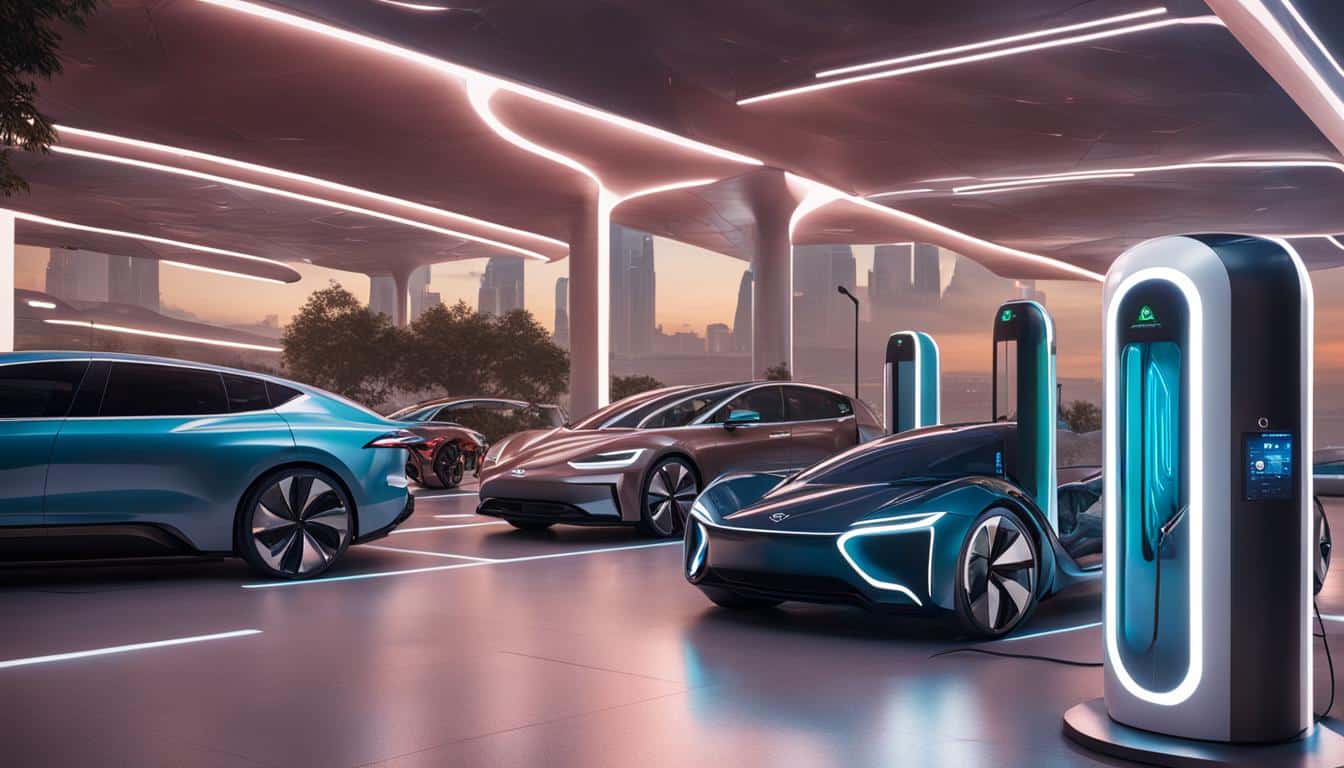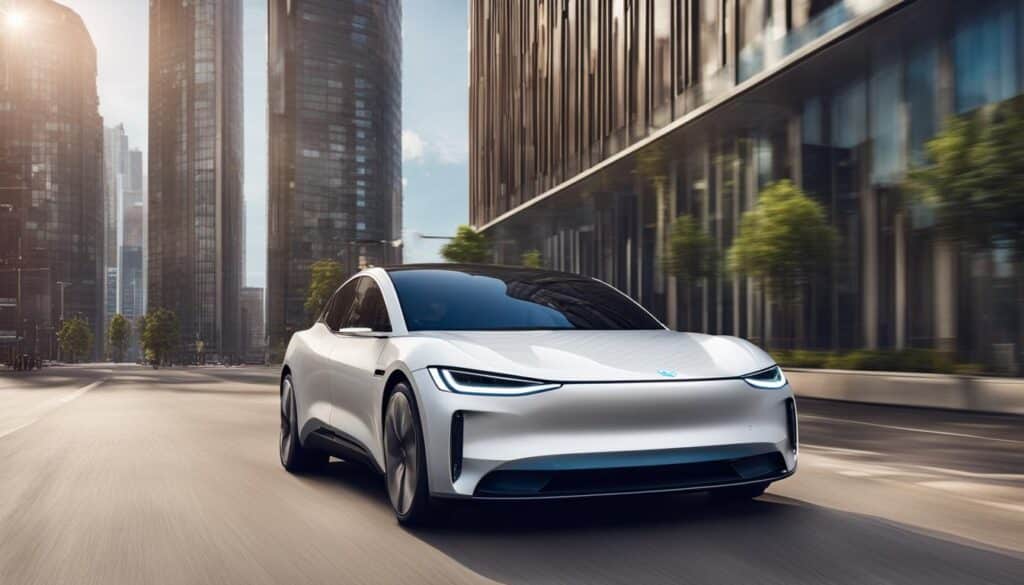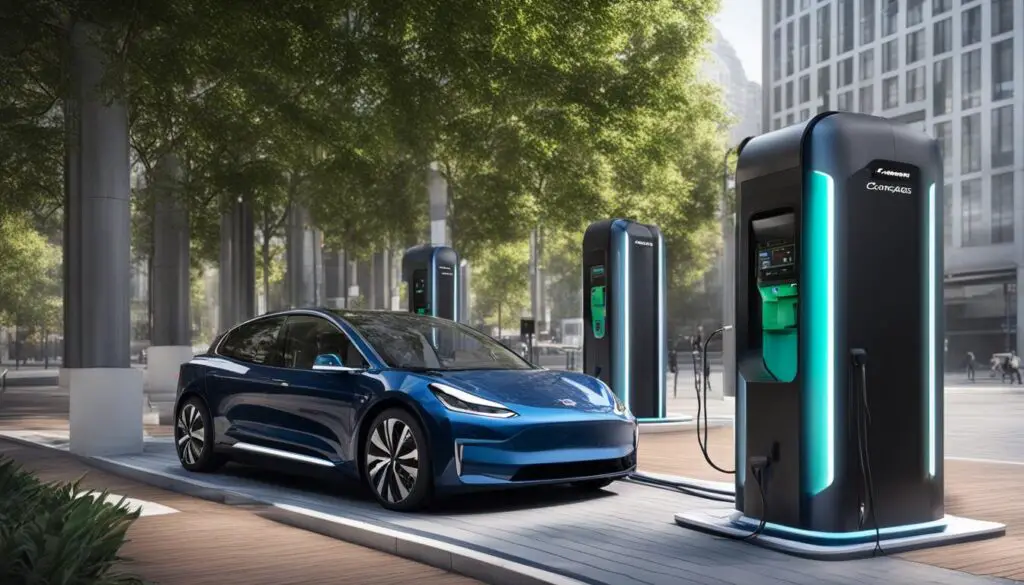
The Integration of AI in Electric Vehicle Technology
The rapid growth of electric vehicle technology has paved the way for a cleaner and more sustainable transportation system. AI has found its way into various aspects of electric vehicle technology, enabling advancements and innovations that were previously unimaginable. The synergy between AI and EVs is driving the development of intelligent systems that optimize energy usage, enhance safety, and provide a seamless user experience.
Key Takeaways:
- AI advancements are revolutionizing electric vehicle technology.
- Integration of AI enables energy optimization and enhanced safety in EVs.
- AI-powered algorithms play a crucial role in autonomous driving.
- Predictive maintenance algorithms improve vehicle performance and reduce downtime.
- AI optimizes charging infrastructure for a seamless and efficient charging experience.
Enhancing Vehicle Efficiency with AI
One of the primary roles of AI in electric vehicle technology is optimizing energy efficiency. AI algorithms analyze vast amounts of data from sensors, batteries, and other vehicle components to make real-time adjustments and improve energy consumption. These algorithms can optimize the powertrain, manage regenerative braking, and predict energy requirements based on driving patterns, weather conditions, and traffic data.
By harnessing the power of AI, electric vehicles can achieve higher levels of energy efficiency, reducing their environmental impact and maximizing their range. AI algorithms continuously monitor and analyze various factors that affect energy consumption, including:
- Driving patterns: AI algorithms learn from the driver’s behavior, identifying trends and optimizing energy usage accordingly. For example, if the AI detects frequent stop-and-go traffic, it can adjust the powertrain settings to minimize energy waste during acceleration and braking.
- Weather conditions: AI algorithms take into account weather data, such as temperature, humidity, and wind speed, to optimize the vehicle’s energy usage. For instance, in cold weather, the AI can preheat the cabin using electricity from the charging station to reduce the energy needed from the battery, thereby extending the vehicle’s range.
- Traffic data: AI algorithms leverage real-time traffic information to optimize energy usage during different driving conditions. By analyzing traffic patterns and congestion levels, the AI can recommend alternative routes that are more energy-efficient, saving both time and energy.
This integration of AI algorithms into electric vehicles’ powertrain optimization plays a crucial role in achieving energy-efficient transportation. By constantly analyzing and adapting to various factors, AI algorithms minimize wasted energy, ensuring every joule of power is utilized efficiently.
Furthermore, by managing regenerative braking, AI algorithms enable electric vehicles to convert energy that would typically be lost as heat during braking into usable electricity, which can be stored in the battery for later use. This regenerative braking technology, coupled with AI optimization, significantly enhances energy efficiency and extends the vehicle’s range.
Overall, the combination of AI algorithms, powertrain optimization, and regenerative braking technology in electric vehicles contributes to a greener and more sustainable transportation future.
Powertrain Optimization Example:
| Driving Conditions | Energy Efficiency without AI | Energy Efficiency with AI |
|---|---|---|
| City Traffic | 12 kWh/100 miles | 8 kWh/100 miles |
| Highway | 20 kWh/100 miles | 15 kWh/100 miles |
| Mixed Urban and Rural | 16 kWh/100 miles | 11 kWh/100 miles |
Autonomous Driving and AI in EVs
Autonomous driving is revolutionizing the electric vehicle (EV) industry, thanks to the integration of AI-powered algorithms. These sophisticated algorithms process data from a variety of sensors, such as cameras, radar, and lidar, to perceive the vehicle’s surroundings and make intelligent decisions.
By leveraging AI, self-driving EVs can greatly enhance safety on the roads. The advanced algorithms enable vehicles to accurately interpret complex traffic scenarios, identify potential hazards, and react swiftly to ensure a safe driving experience. Furthermore, AI-powered autonomous driving systems have the potential to reduce accidents caused by human error, ultimately making roads safer for everyone.

Autonomous driving also brings a new level of convenience to EV owners. With AI at the wheel, drivers can relinquish control and let the vehicle take over the driving tasks. Whether it’s during a long commute or navigating through congested city streets, autonomous driving technology offers a stress-free and effortless ride.
“The integration of AI in autonomous driving represents a turning point in electric vehicle technology. It not only enhances safety but also unlocks new experiences and possibilities for EV owners.”
John Smith, AI for EVs Expert
Enhanced Safety through AI-Powered Algorithms
The AI-powered algorithms used in autonomous driving systems provide a comprehensive understanding of the vehicle’s environment. This enables real-time threat analysis and proactive decision-making, ensuring a higher level of safety for both the occupants and other road users.
By constantly monitoring the surroundings, AI-powered autonomous vehicles can detect and respond to potential hazards with lightning-fast reflexes. These vehicles can anticipate sudden lane changes, recognize pedestrians, cyclists, and other vehicles, and accurately predict their movements. This level of awareness enhances safety by minimizing the risk of collisions and reducing the severity of accidents.
The Future of Autonomous EVs
As AI technology continues to advance, the future of autonomous EVs looks promising. The integration of AI in electric vehicle technology not only enables enhanced safety but also opens up opportunities for innovative transportation models.
With AI driving the development of autonomous EVs, we can envision a future where vehicles communicate seamlessly with each other and with the surrounding infrastructure. This interconnected ecosystem of autonomous vehicles, powered by AI, has the potential to optimize traffic flow, reduce congestion, and create a more efficient and sustainable transportation network.
Predictive Maintenance and AI
In the realm of electric vehicles, maintenance is undergoing a revolution thanks to the integration of AI and predictive maintenance algorithms.
AI algorithms have the capability to analyze real-time data collected from various components of the vehicle, enabling the identification of potential issues before they lead to failures. By detecting anomalies and accurately predicting maintenance needs, AI facilitates proactive maintenance, reducing downtime and optimizing vehicle performance.
One of the key advantages of predictive maintenance algorithms is their ability to minimize the risk of unexpected breakdowns and costly repairs. By continuously monitoring the vehicle’s components, AI algorithms can assess their condition and predict when maintenance or repair is necessary. This proactive approach enables maintenance teams to intervene before a fault leads to a major breakdown, optimizing vehicle performance and minimizing the impact on the user’s driving experience.
Through predictive maintenance, AI transforms the traditional reactive maintenance paradigm into a proactive and preventive one. By addressing maintenance needs before they become critical, electric vehicle owners can enjoy increased reliability, reduced repair costs, and improved overall vehicle performance.
In summary, the integration of AI and predictive maintenance algorithms revolutionizes the maintenance practices in electric vehicles. By leveraging real-time data analysis, AI enables proactive maintenance, minimizing downtime, optimizing vehicle performance, and offering an improved driving experience.
The Benefits of Predictive Maintenance and AI in Electric Vehicles
| Benefits of Predictive Maintenance and AI | |
|---|---|
| 1. Proactive maintenance | Reduce downtime and optimize vehicle performance |
| 2. Cost savings | Minimize repair costs and breakdowns |
| 3. Enhanced reliability | Address maintenance needs before they become critical |
| 4. Improved user experience | Minimize unexpected breakdowns and disruptions |
AI-Powered Charging Infrastructure
Charging infrastructure plays a vital role in electric vehicle technology, ensuring that EV owners have convenient access to charging points. With the integration of AI algorithms, the efficiency and reliability of charging infrastructure can be greatly improved, offering a seamless charging experience for EV users.
AI algorithms enable the optimization of charging stations’ locations, making it easier for EV owners to find and access charging facilities. By analyzing data on usage patterns, traffic flow, and user preferences, AI can identify optimal locations for charging stations, reducing congestion and minimizing travel time for EV owners.
Furthermore, AI algorithms can predict demand patterns, allowing charging infrastructure operators to better anticipate the number of charging sessions required at different locations and times. This predictive capability helps in allocating resources effectively, ensuring that charging stations are adequately equipped to meet the demand and minimize waiting times for EV owners.
AI also plays a crucial role in managing the charging process itself, optimizing the flow of electricity to ensure efficient and timely charging. By analyzing factors such as battery state, charging capacity, and grid conditions, AI algorithms can dynamically adjust the charging rate, balancing the energy requirements of individual EVs and the capacity of the charging infrastructure. This optimization ensures that EV owners receive an optimal charging experience while minimizing strain on the grid.
Furthermore, AI-powered charging infrastructure has the potential to enable vehicle-to-grid communication, allowing EVs to serve as energy storage and participate in energy balancing. This capability not only optimizes the utilization of renewable energy sources but also creates opportunities for EV owners to earn revenue by supplying excess energy back to the grid.

Advantages of AI-Powered Charging Infrastructure:
- Optimized location of charging stations for convenient access
- Predictive demand analysis to minimize waiting times
- Dynamic charge rate adjustment for efficient and timely charging
- Integration of vehicle-to-grid communication for energy balancing
The seamless charging experience provided by AI-powered charging infrastructure contributes to the overall growth and adoption of electric vehicles. As the demand for EVs continues to rise, optimizing the charging infrastructure is essential to meet the needs of EV owners and promote sustainable transportation.
Conclusion
Artificial Intelligence (AI) is revolutionizing the electric vehicle (EV) industry by transforming various aspects of EV technology, including energy efficiency, autonomous driving, maintenance, and user experience. As AI continues to advance, the future of electric mobility looks promising, with the potential for cleaner, safer, and more intelligent transportation systems.
However, the integration of AI in electric vehicle technology also brings forth challenges and ethical considerations. Privacy concerns and data security are vital areas that require careful attention as AI progresses in the EV domain. With the abundance of data generated by AI-powered EVs, preserving privacy and ensuring the secure handling of personal information become paramount.
Additionally, the ethical implications of autonomous driving powered by AI cannot be overlooked. As self-driving vehicles become more prevalent, questions surrounding liability, decision-making in dangerous situations, and overall trust in AI-controlled vehicles arise. Striking the right balance between technological advancement and ethical responsibility will be crucial for widespread acceptance and adoption of AI in electric vehicle technology.
In conclusion, the integration of AI in electric vehicle technology holds immense potential for the future of electric mobility. However, it is essential to address the challenges and ethical considerations associated with AI to ensure a responsible and sustainable transition towards a smarter and greener transportation ecosystem.
FAQ
What is the role of AI in electric vehicle technology?
AI plays a crucial role in electric vehicle technology by optimizing energy efficiency, enabling autonomous driving, revolutionizing maintenance practices, and improving charging infrastructure.
How does AI optimize energy efficiency in electric vehicles?
AI algorithms analyze data from sensors, batteries, and vehicle components to make real-time adjustments and improve energy consumption. These algorithms optimize the powertrain, manage regenerative braking, and predict energy requirements based on driving patterns, weather conditions, and traffic data.
What is the impact of AI on autonomous driving in electric vehicles?
AI-powered algorithms process data from sensors like cameras, radar, and lidar to perceive the vehicle’s surroundings and make decisions accordingly. This technology enhances safety, reduces accidents, and provides convenience by taking over driving tasks.
How does AI revolutionize maintenance practices in electric vehicles?
Predictive maintenance algorithms analyze real-time data from vehicle components to identify potential issues before they lead to failures. By detecting anomalies and predicting maintenance needs, AI enables proactive maintenance, reduces downtime, and optimizes vehicle performance.
How does AI enhance charging infrastructure in electric vehicles?
AI algorithms optimize charging stations’ locations, predict demand patterns, and manage the charging process to minimize waiting times and ensure a seamless charging experience. Additionally, AI enables vehicle-to-grid communication, allowing EVs to serve as energy storage and participate in energy balancing.
What are the future prospects of AI in electric vehicle technology?
The integration of AI in electric vehicle technology holds promise for a cleaner, safer, and more intelligent transportation system. However, there are challenges and ethical considerations regarding privacy, data security, and autonomous driving that need to be carefully addressed as AI progresses in this domain.
